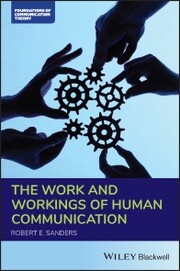Detailansicht
The Work and Workings of Human Communication
eBook - Foundations of Communication Theory Series
ISBN/EAN: 9781119706533
Umbreit-Nr.: 1048721
Sprache:
Englisch
Umfang: 304 S., 1.34 MB
Format in cm:
Einband:
Keine Angabe
Erschienen am 02.03.2021
Auflage: 1/2021
E-Book
Format: EPUB
DRM: Adobe DRM
- Zusatztext
- <p><b>Discover the fundamentals of human communication with this comprehensive and insightful resource</b></p><p>Written in four sections,<i>The Work and Workings of Human Communication</i> identifies the underlying fundamentals that make our communication distinctively human. These fundamentals are the common ground that tie together the many topics and subject matters covered by the study and discipline of communication. They are also the basis of the unique contribution of the communication discipline to the social sciences.</p><p>Professor, researcher and theorist Robert E. Sanders starts by focusing on what is unique about human communication and moves on to an examination of the complexities of scientific inquiry in the social sciences in general and in the communication discipline specifically. At the heart of the matter is the fact that humans are thinking beings who can make choices and therefore are not entirely predictable. This points towards new topics and questions that are likely to arise as the discipline evolves.</p><p>Sanders' approach leads to recognition of the fact that communication is at the center of how humans build our ways of life and participate together. By focusing on the underlying fundamentals that give rise to the discipline's topics and subject areas,<i>The Work and Workings of Human Communication</i> encourages students to engage in independent thought about what they want to contribute by:</p><ul><li>Emphasizing the importance of communication in creating, sustaining or changingand participating inour ways of life on an interpersonal level and on a societal level</li><li>Recognizing that human communication is inherently collaborative; people affect situations by interacting<i>with</i> others, not acting<i>on</i> others</li><li>Explaining the history, current agendas and possible future of the social science side of the Communication discipline</li></ul><p>A perfect resource for new graduate students in introductory communication courses who have an interest in the social science side of the discipline,<i>The Work and Workings of Human Communication</i> is also highly valuable for undergraduate communication and liberal arts students who don't possess a background in the discipline.</p>
- Kurztext
- Discover&nbsp;the fundamentals of human communication with this comprehensive and insightful resource&nbsp; Written in four sections,&nbsp;The Work and Workings of Human Communication&nbsp;identifies the underlying fundamentals that make our communication distinctively human. These fundamentals are the common ground that tie together the many topics and subject matters covered by the study and discipline of communication. They are also the basis of the unique contribution of the communication discipline to the social sciences.&nbsp;&nbsp; Professor,&nbsp;researcher&nbsp;and theorist Robert E. Sanders starts by focusing on what is unique about human communication and moves on to an examination of the complexities of scientific inquiry in the social sciences in general and in the communication discipline specifically. At the heart of the matter is the fact that humans are thinking beings who can make choices and therefore are not entirely predictable. This points towards new topics and questions that are likely to arise as the discipline evolves.&nbsp;&nbsp;&nbsp; Sanders&rsquo; approach leads to recognition of the fact that communication is at the center of how humans build our ways of life and participate together. By focusing on the underlying fundamentals that give rise to the discipline&rsquo;s topics and subject areas,&nbsp;The Work and Workings of Human Communication&nbsp;encourages students to engage in independent thought about what they want to contribute by:&nbsp; &nbsp; Emphasizing the importance of communication in creating,&nbsp;sustaining&nbsp;or changing&mdash;and participating in&mdash;our ways of life on an interpersonal level and on a societal level&nbsp;&nbsp; Recognizing that human communication is inherently collaborative; people affect situations by interacting&nbsp;with&nbsp;others, not acting&nbsp;on&nbsp;others&nbsp;&nbsp;&nbsp; Explaining the history, current agendas and possible future of the social science side of&nbsp;the Communication discipline&nbsp; &nbsp; A perfect resource for new graduate students in introductory communication courses who have an interest in the social science side of the discipline,&nbsp;The Work and Workings of Human Communication&nbsp;is also highly valuable for undergraduate communication and liberal arts students who don&rsquo;t possess a background in the discipline.&nbsp; &nbsp;
- Autorenportrait
- <p><b>Robert E. Sanders, Ph.D.</b> in Communication from the University of Iowa, has focused his research and theoretical work on details of the way people communicate in social interactions to influence others as a microcosm of the work and workings of human communication, and the underlying communicative competence that supports communicating strategically. He wrote the book<i>Cognitive Foundations of Calculated Speech</i>, co-edited<i>Handbook of Language and Social Interaction</i>, and has authored numerous journal articles and book chapters on language, social interaction, and communicative competence.</p>
